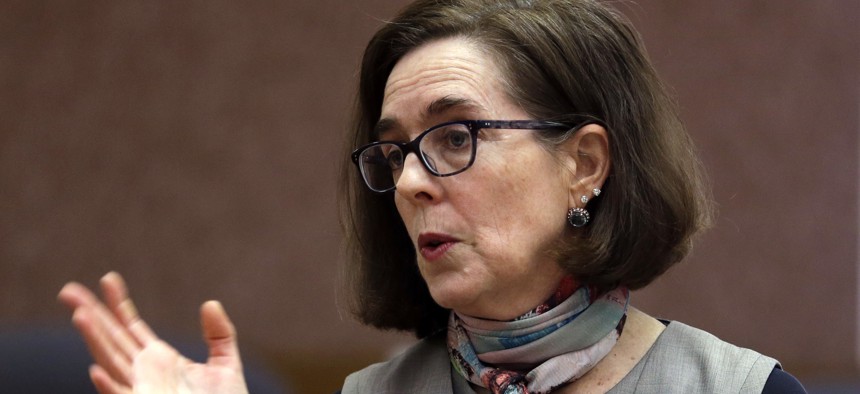Another Volley Between States and the Justice Department Over Recreational Marijuana

Oregon Gov. Kate Brown speaks to media representatives in Salem, Ore. on Jan. 26, 2017. AP Photo/Don Ryan

Connecting state and local government leaders
In the latest round of official correspondence, Oregon Gov. Kate Brown highlighted the state’s tracking measures for pot and noted flaws with a report U.S. Attorney General Jeff Sessions referenced.
Oregon Gov. Kate Brown defended the state’s recreational marijuana policies in a letter sent Tuesday to U.S. Attorney General Jeff Sessions.
The letter was the latest correspondence between the nation’s top law enforcement officer and states with regulated systems for adults to purchase marijuana for recreational use. Sessions has voiced criticism about pot use and has raised questions about the effectiveness of state regulatory regimes for recreational marijuana.
Brown in her letter highlighted Oregon’s system for tracking “from seed to sale” marijuana sold in state-licensed marketplaces, in order to ensure none of it is not unlawfully diverted. This is done, she noted, using measures that include radio frequency identification tags.
The Democratic governor also pointed to a bill she recently signed to increase criminal penalties for certain marijuana-related crimes, and a public awareness campaign the state’s health authority launched to dissuade minors from using marijuana.
Brown said these and other actions by the state are helping to ensure compliance with a document known as the Cole Memorandum.
Former Deputy Attorney General James M. Cole authored the memo in 2013.
It explains that if states establish strong regulations for marijuana, which adhere to certain federal priorities, then law enforcement efforts related to the drug will be largely left to state and local authorities.
Some of the priorities the memo outlines include keeping pot away from kids, ensuring revenues do not go to criminal enterprises and preventing the flow of marijuana across state lines.
The memo warns that if states fall short of these goals, the federal government may challenge marijuana regulatory systems, or to take enforcement actions, including criminal prosecutions.
Eight states and the District of Columbia have made it legal for adults to purchase marijuana for recreational use, according to the National Conference of State Legislatures.
Sessions has previously indicated that he's not sure this is a good idea.
When he was still serving as a Republican U.S. senator from Alabama he said that "we need grownups in charge in Washington to say marijuana is not the kind of thing that ought to be legalized” and that “good people don’t smoke marijuana.”
Brown and the governors of Alaska, Colorado, and Washington, sent a letter in April to Sessions and U.S. Treasury Secretary Steven Mnuchin urging that the Trump administration engage with their states before altering the Cole Memorandum, or other federal guidance.
Sessions followed up with a letter to Brown in July.
He emphasized that “Congress has determined that marijuana is a dangerous drug” and that the illegal distribution or sale of it is a crime. And he also said that the Cole Memorandum “does not alter in any way” the Justice Department’s authority to enforce federal marijuana laws, regardless of state statutes.
The attorney general also referenced a draft report from the Oregon State Police.
He suggested the report raised concerns about issues such as the possible diversion of marijuana to the black market, “pervasive illicit cannabis cultivation in the state” and that pot legalization provided “an effective means to launder” cannabis products and profits.
Brown said in her latest missive on Tuesday that the report does not reflect the “on the ground” reality in Oregon in 2017 and was meant to provide a baseline understanding of cannabis-related issues prior to the legalization of recreational marijuana sales in Oregon.
She also said the state police determined that the draft report contained inaccurate data and “heavily extrapolated” conclusions that were incorrect.
Travis Hampton, superintendent of the Oregon State Police, wrote to Sessions last week informing him that the draft report was meant to be a “living document” and that his agency had no plans to publish it until more data could be gathered.
He noted that a news article earlier this year referred to a leaked copy of the report and that the state police tried to make clear that it was “not accurate, not validated, outdated and the Oregon State Police did not endorse the conclusions.”
“Unfortunately,” Hampton said in his letter to Sessions, “you sourced the same leaked draft document as evidence against Oregon’s marijuana regulatory structure.”
Bill Lucia is a Senior Reporter for Government Executive’s Route Fifty and is based in Washington, D.C.

NEXT STORY: What to Expect When You’re a Mayor Expecting Trump





